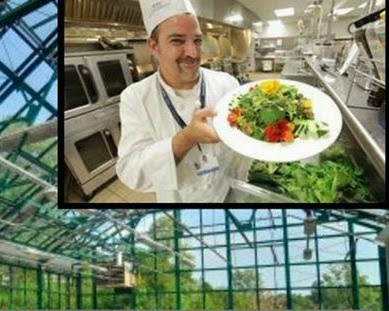| Online: | |
| Visits: | |
| Stories: |

| Story Views | |
| Now: | |
| Last Hour: | |
| Last 24 Hours: | |
| Total: | |
More U.S. Hospitals Using Organic Produce Gardens for Recovery
 Heather Callaghan
Heather Callaghan
Activist Post
In an age where food is thought of as “filler” and of little importance in the recovery process, some hospitals are turning that idea on its head by embracing local organic food for recovery and beyond.
Recently, Rodale Institute partnered up with St. Luke’s University Health Network in Pennsylvania to bring the local organic farm to the hospital platter.
Perhaps the term “hospital cuisine” will now take on a truer, less sarcastic meaning. Like, maybe it will be easier to “stomach” by not appearing already digested. But seriously folks…
St Luke’s Anderson Campus has 300 acres of farmland which used to sprout typical ag crops like corn and soy, EcoWatch reports. Not so anymore, as the hospital administration fully realized the holistic impact of not only providing “organic” (which can be vague) but also the fresh-factor of local and importance of soil health. Thus, Rodale was asked to start transforming the plot to foster organic vegetables, not only to revitalize hospital patients, but also provide for the cafeteria.
It’s a three-year plan with hopes of expansion, hiring more farmers including those without access to their own land, building greenhouses for year-round production, and utilizing a small batch cannery for winter meals.
EcoWatch shared the mindset of this system:
We have created this model with the belief that it can, and should, be replicated at every hospital throughout the U.S.
While Johns Hopkins Medicine Center finds it to be a myth that non-organic produce could lead to a recurrence of breast cancer, they encourage patients to eat organic whenever possible, eliminate processed foods and offer customized nutritional plans that go far beyond the typical prescription of “eat healthier and exercise more.”
The cost of St. Luke’s model is unclear, but showing that it is easy to replicate using local partnerships is important for teaching and spreading the idea of its use. Perhaps it will encourage hospitals that tried and failed to polish their approach.
Healing gardens are now recognized for treating emotional health issues like Post Traumatic Stress Disorder, with great success. Gardens even just for their beauty have an impact on patient care. But imagine if every part of these inbound farming systems were utilized for recovery. Patients immersing themselves in the garden as much as possible, benefiting from the edible plantation, rooftop gardens for the hospital and so on… Imagine the stress and burden of the hospital system melting away as overburdening ceases and both staff and patients’ nutritional needs are met.
Heather Callaghan is a natural health blogger and food freedom activist. You can see her work at NaturalBlaze.com and ActivistPost.com. Like at Facebook.
Recent posts by Heather Callaghan:
- Disease and 3 Recent Social Engineering “Challenges”
- Harvard Professor Warns, CCD is Only the First Alarm Bell from Bees
- Common Antibiotic Linked with Heart Deaths
Source: http://www.activistpost.com/2014/08/more-us-hospitals-using-organic-produce.html




